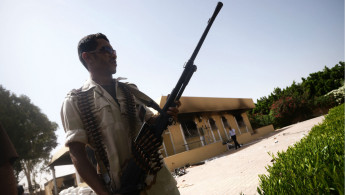UN prepares for 'last chance' Libya talks
The UN has gathered members of Libya's rival political factions for talks in Geneva dubbed the "last chance" to halt intensifying fighting for the country's main cities and oil wealth.
However, the talks on Wednesday are not being attended by representatives of Khalifa Hafta, a general who supports the internationally recognised government sitting in Tobruk, nor members of Libya Dawn, a movement which supports a rival administration which sits in the capital, Tripoli.
As a result, analysts warned that negotiations were unlikely to have any impact unless the leaders of the warring armed groups become directly involved.
The talks will be overseen by the UN special envoy for Libya Bernardino Leon who has been shuttling between the parties to the conflict for months.
He was to hold a 1330 GMT news conference ahead of the opening.
The talks are aimed at agreeing the formation of a unity government to replace the rival administrations and a calling a ceasefire between militias and their withdrawal from Libya's civilian areas.
The Tobruk government has been based in the remote east after Libya Dawn kicked it out of the capital in August. Most foreign countries pulled their diplomats from Tripoli after the takeover.
In a mark of the difficulties the UN has faced in convening the Geneva talks at all, the UN mission acknowledged late on Tuesday that the attendance of several key participants had yet to be confirmed.
| The dialogue will fail because the UN has not chosen the right actors. Mohammed al-Ferjani, political analyst. |
The EU's foreign policy chief Federica Mogherini said: "I want to praise both sides participating and encourage all those in Libya that have not yet decided on participation... to do so".
Mogherini warned on Saturday that the Geneva process "represents a last chance which must be seized".
The confirmed participants include supporters of the recognised government and some backers of the rival Tripoli administration - but no military commanders.
"The dialogue will fail because the UN has not chosen the right actors," said political analyst Mohammed al-Ferjani.
"The participants are politicians and have no presence or influence on the ground."





 Follow the Middle East's top stories in English at The New Arab on Google News
Follow the Middle East's top stories in English at The New Arab on Google News
![Israeli forces ordered bombed Gaza's Jabalia, ordering residents to leave [Getty]](/sites/default/files/styles/image_330x185/public/2176418030.jpeg?h=a5f2f23a&itok=_YGZaP1z)

